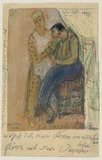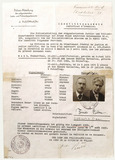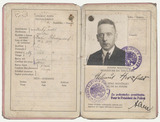Else Lasker-Schüler’s passport
Else Lasker-Schüler’s passport
Es ist der Tag in Nebel völlig eingehüllt,
Entseelt begegnen alle Welten sich –
Kaum hingezeichnet wie auf einem Schattenbild.Wie lange war kein Herz zu meinem mild …
Die Welt erkaltete, der Mensch verblich.
– Komm, bete mit mir – denn Gott tröstet mich.Wo weilt der Odem, der aus meinem Leben wich? –
Ich streife heimatlos zusammen mit dem Wild
Durch bleiche Zeiten träumend – ja ich liebte dich …[The day is completely shrouded in mist,
All worlds come together lifelessly –
Barely sketched in like a silhouette.For how long was no heart mild to mine ...
The world grew cold, the people pale.
– Come, pray with me – for God comforts me.Wither the breath which drains from my life?
I wander homeless with the quarry
Dreaming through pale times – yes I loved you... (ed. trans.)]
Extract from the poem Die Verscheuchte (The Displaced, 1934) by Else Lasker-Schüler
Else Lasker-Schüler had been in Swiss exile since 1933. She was only granted leave to remain and her hopes of receiving a residence permit remained unfulfilled. This situation lasted for over six years. The years of Swiss exile were therefore marked on the one hand by the persistent struggle for survival: without a residence permit there would be no work permit, and without a work permit she couldn’t earn money. The drawings which she sold illegally didn’t bring in nearly enough to finance her life, and among Lasker-Schüler’s exile correspondence there are numerous letters requesting assistance.
On the other hand, the conditions and departure deadlines imposed by her indefinite leave to remain meant constant relocation, depending on whichever canton would agree to extend her permit. But she undertook short foreign trips to be able to return to Switzerland. Lasker-Schüler’s time in exile was consequently a constant struggle with bureaucracy, a cycle of registering, deregistering, reregistering. The page from her passport shown is testament to this situation. As early as 23 October 1934 the national foreign police noted: “Mrs Lasker has no funds of her own, but is instead reliant on the charity of private individuals [...]. [...] The continued presence of the petitioner is neither necessary nor desirable [...].” In August 1939 came the definitive entry ban, meaning that the writer, travelling in Palestine, was not permitted to return to Switzerland.




